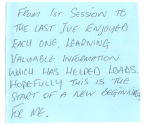Persistent Physical Symptoms Service (PPSS)
Referral Criteria
You need to:
- Live in North Cumbria
- Have physical symptoms that are stopping you from living a happy, healthy life and that have lasted for at least 6 months
GPs, medics or physiotherapists can refer people into this service. If you are a health professional and unsure and would like to discuss a case with one of our team, click here for our duty consultation contact number. You can book an appointment to speak to us for further advice (this is not for patients - potential patients should speak to their GP/health team).
Is PPSS right for me?
If you say “Yes” to many of the questions below, then our service may be able to help you. If you would like to be referred to our service then please discuss this with your GP. They will be able to refer you to us.
- Have you been experiencing Persistent Physical Symptoms for more than six months?
- Have you been given a diagnosis of Chronic Fatigue Syndrome (ME), Persistent (Chronic) Pain, Fibromyalgia, Functional Neurological Symptoms (including non-epileptic seizures), Medically Unexplained Symptoms or Irritable Bowel Syndrome?
- Have you had medical investigations and treatments which haven’t really helped you to manage your symptoms?
- Do you feel your symptoms are stopping you from living life the way you would like to?
- Are you suffering from low mood as a result of the impact the symptoms are having on your life?
- Are you having to stop taking pain medication, or would like to stop?
Who are we and what do we do?
The Persistent Physical Symptoms Service launched in April 2016. Our team is made up of Psychological Therapists, Physiotherapists, Occupational Therapists and Living Well Coaches.
In the past, many people with long-term pain were treated using medications or invasive procedures such as facet joint injections and epidurals. In recent years, research has shown that there is limited evidence that these treatments work for persistent pain. Although complications are not common, they can potentially have serious consequences. Some pain medications can lead to addiction and other adverse side effects. The National Institute for Health and Clinical Excellence (NICE) no longer recommends these treatments for some conditions.
A rehabilitative approach involving psychological therapies and physiotherapy-based interventions has been shown to have a positive impact for people experiencing persistent physical symptoms. This is not a "quick fix", but over time by using techniques such as pacing, mindfulness and stress management, many people find that they are more able to live with their symptoms.
Our ethos is that symptoms can be managed and their impact on your life minimised, even if it is not possible to "get rid of" them completely. We aim to support our patients to live a life which is driven by their values rather than their symptoms.
Our team will work with you to help you to explore and understand how you can manage and live with your symptoms. We will help you to make positive changes, for example:
- Managing your pain
- Helping you to sleep better
- Returning to activity and movement
- Helping to manage fatigue and tiredness
- Managing anxiety, low mood, and stress
- Helping you to learn how to take care of yourself
- Managing unhelpful thoughts
- Building better routines
- Helping you to get back to work or hobbies
We do not offer medication advice, or send people for tests or scans.
See the drop-downs below to find out more about the individual roles found in the PPSS team. Our PPSS Allied Health Professional page provides more detail about what 1:1 support our physiotherapists and occupational therapists may be able to offer.
What is the role of Living Well Coaches in PPSS?
They will work with you on issues that may be getting in the way of you living a happy, healthy life. This involves helping you to set goals, and supporting you to achieve these. They may also give you information about other services that may be able to help you.
What is the role of Occupational Therapists in PPSS?
They will help you with practical activities to increase your quality of life. This may include:
- Self-care – washing, dressing, toileting and bathing
- Work – return to work, helping you to stay in work
- Hobbies – finding a way to access hobbies and interests which you used to enjoy
What is the role of Physiotherapists in PPSS?
They can offer education on pain and fatigue, and support you to move safely, and increase your physical strength and stability.
What is the role of Psychological Therapists in PPSS?
They will offer you talking therapy to help you to improve your mood and to understand how your physical symptoms and your mood are linked.
Some of the types of therapy that may be used are:
- Cognitive Behavioural Therapy (CBT)
- Eye Movement Desensitisation Reprocessing(EMDR)
- Compassion Focused Therapy (CFT)
- Acceptance and Commitment Therapy (ACT)
Please click here to find out more about these different therapy types.
What to expect if you come to see us?
If you are referred to our team, you will be invited to attend an assessment appointment. We will discuss your physical symptoms and how these are affecting you.
We will discuss the treatment options, and together we will agree a plan.
You may be invited to one of our groups to learn different ways to manage your symptoms, or to individual appointments with one of our team. We may also help you to access a different service that can better meet your needs.
Confidentiality
Details of your sessions are put on your medical record, but you can tell us if you do not feel ok with anything being shared with your GP or other members of your care team.
We will only talk about you outside the team when you give permission, or if we think you are at risk of harm and we need to protect you or others.
We will keep your GP and/ or consultant up to date by sending letters about your appointments so they know how you are and what you are currently working on – you will also get a copy of these letters.
Why this approach?
Information from the National Institute for Health and Care Excellence suggests that working together with you in this way gives you the best opportunity to lead a happier, healthier life, even with difficult physical symptoms. Please click here for more information about why we take the approach we do.
The following videos help to further explain the foundations and principles behind the approach we take to supporting our patients
What is Self-Management?
00:03 Viewed 2185 times
Published on 25 Sep 2015
Watch patient stories from Scottish pain charity Pain Concern about what it means to self-manage your pain. "You have to want to live again." That’s the key to managing pain, according to Diane. It can be a long, winding road, but many people living with pain have learnt strategies that help them to get the most out of life alongside their condition, rather than being dominated by it.
Why Emotional Support is Vital to Recovery
00:41 Viewed 10988 times
Published on 22 Sep 2015
Persistent symptoms can involve a lot of loss – of friendships, independence, and plans for the future. The emotional impact of these losses, as well as of the symptoms themselves, often hits people hard. People with long-term conditions can find themselves struggling with low mood, depression, anxiety, and isolation – this can in turn make the symptoms worse.
It's important to tackle these emotional impacts, as well as treating the symptoms. This doesn't mean that the symptoms are 'all in the mind', though. This video from Pain Concern explains what can be done to help.
Why are medical investigations not always useful?
00:10 Viewed 1383 times
Published on 22 Sep 2015
Doctors and patients can both get caught up in an almost endless search for a cure, or a defined diagnosis of what's causing symptoms. Searching for a medical solution is understandable, but it can delay people in starting to learn to manage their symptoms. With the right support and guidance from healthcare professionals, people can move towards playing an active role in their care, often becoming less dependent on medication. Watch this video from Pain Concern to find out more.
Why self-management programmes like PPSS?
00:12 Viewed 1745 times
Published on 22 Sep 2015
'Self-management' doesn’t mean being abandoned to 'get on with it' on your own. Support can come from healthcare professionals, family, friends, voluntary organisations or support groups. If your symptoms are having a big impact, self-management programmes can help you to get your life back on track. This involves focusing on what's most important to you – this could be relationships, activities, work – and learning how to be more involved in these areas without flaring-up the pain. Watch this video from Pain Concern to find out more.
What do our patients say?
Read how Sue was able to manage her pain and fatigue following a PPSS 'Living Well' Group
"When I was first asked if I’d like to join a Living Well Group I felt really unsure, but said I would go along to it to see what it was like.
When it came to the first day of the course, I felt very apprehensive and nervous, but told myself: “It is better to try it and not like it, than not try it at all, and possibly miss out on something good.” Also, I knew that if I didn't like it I could leave.
Well, all I can say is that the course was one of the best things I ever did. The people running the group were very approachable, laid-back, had a great sense of humour (which in my opinion is very important). They were non-regimental and made everyone feel very relaxed and welcome - an approach that stayed throughout the course.
Mixing with other people with the same or similar problems was fantastic, because it made me realise that I wasn't alone in life. It made me feel sane. I wasn't being judged, I was accepted and this made me feel normal. The other people in the group knew what I was talking about and could relate to what I was saying. I also learnt a lot about my illness and how to cope with it – all in a friendly and relaxed atmosphere. The list goes on. But to say it was a group I really looked forward to going to each session speaks volumes not only for the tutors and group members but also the atmosphere and content of the sessions.
The initial nerves and apprehension are a normal feeling going into the unknown, so my advice to anyone being offered the chance to attend a group is: go along to it, and give it a try. It could be one of the best decisions you'll ever make."





